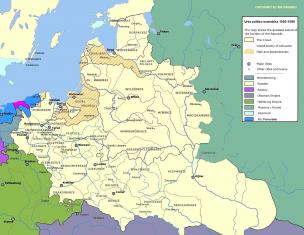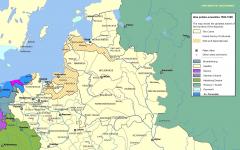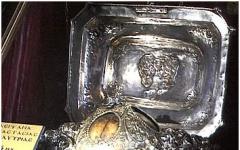There are variable and unchangeable pronouns. Depending on the number and gender of the noun, a variable pronoun is selected, which is used in the sentence.
Celui/ celle (that/that) and ceux/ celles (those) are variable demonstrative pronouns of simple form. Using particles ci and là are formed complex shapes changeable demonstrative pronouns that indicate the location of an object or person in space in relation to the speaker.
Unchangeable demonstrative pronouns include Ce (C’) and ceci, cela, ça , equivalent to Russian " This ".
6.1 Variable demonstrative pronouns (simple form)
Singular | Plural | ||
m.r. | w.r. | m.r. | w.r. |
celui | celle | ceux | cells |
Celui Qui arrivera le dernier n’aura pas un cadeau. - The one who comes last will not receive a gift. | Je préfère la bicyclette de Marie que celle de Jean. – I like Maria’s bike better than Jean’s. | Ceux Qui sont en pantalons sont mes collègues. – Those who are wearing pants are my colleagues. | Celles avec le chat sont mes copines. “The ones with the cat are my friends.” |
In general, modified demonstrative pronouns of a simple form are not used in isolation. They are followed by:
1) participle:
For example: Voici son dessin, voici celui reality par mon fils. - Here is his drawing, here is the one my son made.
2) addition with a preposition (most often de).
The demonstrative pronoun used in sentences of this type is usually not translated into Russian. Instead, the same noun is repeated that was replaced by a pronoun in the French sentence:
For example: Les chaussures de Michel sont noires, cells de Victor sont jaunes. - Michel's shoes are black, Victor's shoes are yellow.
3) relative subordinate clause:
For example: Je vous présente ceux qui ont triomphé ce matin.- I present to you those who won this morning.
6.2 Variable demonstrative pronouns (complex form)
Singular | Plural | ||
m.r. | w.r. | m.r. | w.r. |
celui-ci | celle-ci | ceux-ci | celles-ci |
celui-là | celle-la | ceux-là | celles-là |
Celui-là, on ne peut jamais compter sur lui. –This one, you can never count on him. | Quelle voiture préfères-tu? Celle-ci où celle-là? –What car do you like? This one or that one? | Pauline et les Ivanov ont travaillé ensemble dans le bureau des Ivanov, elle a passé trois heures dans le bureau de ceux-ci. –Polina and the Ivanovs worked together in the Ivanovs' office; she spent three hours in their office. | Parmi toutes les robes, pourquoi a-t-elle choisi celles-ci? –Why did she choose these among all the skirts? |
Particles ci and là indicate the distance of an object and person in space and time. Ci indicates what is closer in space, or replaces the noun that was mentioned last. Là - what follows or was mentioned earlier:
For example: Prenez celui-ci! - Take this one!
(whatever is closer).
Prenez celui-là! - Take that one!
(what comes next).
Jean et Anne étudient bien, mais celle-ci est plus appliquée. - Jean and Anna study well, but the latter (Anna) is more diligent.
6.3 Inflexible pronouns 1. Ce (c’) - “this” Used as a subject with a verb
être
, for example, in the case of selection, when it follows: * relative pronoun (qui, que, dont, …):
C'est la fille dont je t'ai parlée. - This is the girl I told you about.Ce sont les artistes que
nous avons vus au théâtre -
These are the artists we saw in the theater. * subject expressed by a noun:
Ah, c'est beau, l'amour! - Oh, this is beautiful, love!
Ce sont et c'est
used before the names of professions and nationalities when introducing unfamiliar persons:
Ce sont des étudiantes. - These are students.
C'est un chanteur. - This is a singer.
Ce sont des Espagnols. - These are the Spaniards.
When introducing people you know, personal pronouns are used:
Elles sont etudiantes. - They are students.
Robert? Il est chanteur. - Robert? He is a singer.
Olga est espagnole. - Olga is Spanish.
2. Ceci, cela, ça - “this” Used as a subject with all verbs except être; and also as a complement or nominal part of the predicate.
Cela semble normal - This seems normal.- Votre chat avait ceci
dans la gorge, dit le vétérinaire en montrant une grosse boule de fil - “Your cat had it in her throat,” the veterinarian said, showing a large wad of thread.
- Cela replaces a previous sentence or idea and denotes a more distant object. On t'a dit que j'étais malade,
cela est absolument faux - They told you that I was sick, that's not true.Vu d'ici, cela
est un animal et non une plante. - ABOUT Here it looks like an animal, not a plant.
Ceci - introduces an idea that will follow this statement and denotes a closer object.
Je vais te dire ceci - I'm going to tell you this.Ceci
est un vase précieux, pas un jouet - This is a precious vase, not a toy. Ça replaces cela and ceci V:
colloquial speech You can't eat in class.
With the verb être cela can be replaced by ce:
Ce n'est pas très gentil de ta part. -This is not very good of you.
6.4 Excellence
In sentences, find words that are replaced by pronouns
1. Quel vol choisis-tu? Le vol de demain ou celui de mardi? ()
2. Cette revue n’est pas interior, je voudrais voir celle que lit mon voisin.()
3. Quelles sont vos valises, celles-là ou celles-ci?()
4. Tu aimes notre hôtesse? Celle qui nous a accueilli à l’entrée de l’avion? ()
************************************************************************************************************************
6.5. Devoir à la maison
Utilisez celui, celle, ce, ceux-là, ceux, celui-là, cela.
1. ………. Qui n'aura pas fini son travail à temps sera moins payé.
2. Laquelle des deux voitures préférez-vous ?............ de Pierre ou ……….. de Jean ?
3. Décidément, tu ne sais pas……….. que tu veux.
4. J'ai oublié de regarder la météo; j'ai pensé à tout sauf à ………….
5…………. Qui veulent participer à la sortie doivent s’inscrire.
6. Preférez-vous ce vêtement-ci, ou plutôt ………….?
7. Ces ouvriers-ci ont peu travaillé; mais…………. auront une prime, car ils ont fini le travail vite et bien.
Pronoms démonstratifs
Demonstrative pronouns
- indicate a person, object or whole situation;
- have the following forms:
- As a rule, they replace the nouns that have already been discussed.
| The only thing | Plural | |||
| number | number | |||
| Male | simple | celui | ceux | |
| genus | forms | this that | these, those | |
| complex | celui-ci | ceux-ci | ||
| forms | this | these | ||
| celui-là | ceux-là | |||
| That | those | |||
| Female | simple | celle | cells | |
| genus | forms | this one, that one | these, those | |
| complex | celle-ci | celles-ci | ||
| forms | this | these | ||
| celle-la | celles-là | |||
| that | those | |||
| Average | se | |||
| genus | This | |||
| ceci | ||||
| This | ||||
| cela | ||||
| This, | That | |||
| ça | ||||
| This, | That | |||
Simple forms of demonstrative pronouns
✓ Simple forms of demonstrative pronouns are always accompanied by
- a word (noun or infinitive) with a preposition de:
Mon bureau est petit, celui de mon frère est grand. My desk small, my brother's big.
Les fenêtres du salon ouvrent sur la cour. The living room windows overlook the courtyard.
Celles de la cuisine donnent sur la rue. The kitchen windows face the street.
Elle a ce don, celui de plaire. She has this gift, the gift of being liked.
- subordinate attributive:
Le jus d'orange est celui que je prefère. Orange is the juice I prefer.
Tu verras deux routes. Tu prendras celle Qui est plus large.You will see two roads. You will follow the one that is wider
Complex forms of demonstrative pronouns
✓ Complex demonstrative pronouns with particles -ci and -là are used to contrast two objects.
✓ -Ci indicates a closer (or last mentioned) object, -là - a more distant (first mentioned) object.
N.B. These particles are attached to the pronoun using a hyphen.
Quelle est ta bicyclette? What's your bike?
Celle-ci ou celle-la? This one or that one?
Tu vois ce poirier et ce pommier? Do you see this pear and apple tree?
Celui-ci(le pommier) est en fleur et celui-là(le poirier), pas encore. The apple tree is blooming, but the pear tree is not yet.
✓ Celui-là is more often used when emphasizing one subject (in colloquial speech).
C'est bien cette revue que vous voulez? — Do you want this particular magazine?
Oui, celle-la. -Yes this.
✓ Celui-ci means “the one, the last.”
Je voulais entendre la réponse de Roger. Celui-ci gardait le silence.I wanted to hear Roger's answer. He was silent.
✓ Ce is used in structures:
Se + (devoir / pouvoir) étre + noun (adjective)
C'est mon professeur. This is my teacher.
Ce sont mes amis. These are my friends.
Ce doit être facile. This should be easy.
Ce peut être intéressant. This might be interesting.
Ce+ relative pronoun (qui,que, quoi,dont,…)
Regarde ce que je ferai. Look what I'll do.
Ce qui est dit est dit. What is said is said.
Ceà quoi il pense ne nous regarde pas. What he thinks is none of our business.
Ceci, cela
✓ Ceci, cela act as a complement or subject when contrasting two objects or situations:
Tu sais ceci et tu ne sais pas cela. You know this and you don't know that.
Je vais te dire ceci - est interesting, cela,non. This is interesting, then no.
✓ Cela is more common than ceci:
Cela est bien triste. It is very sad.
Cela ne me plaît pas. I do not like it.
Donnez-moi cela. Give it to me.
Je vais te dire ceci - est étrange. This is weird.
✓Ceci occurs mainly when they anticipate some situation:
Rappel-toi ceci, il a menti. Remember this: he lied.
Comprenez ceci nous avons perdu. Understand this: we lost.
Ça is a shortened form of cela, which
- used in many colloquial expressions:
Comment ça va? - How are you doing?
Ça va bien. -Fine.
Ça y est. - Ready.
- used instead of le , la , les if the name has a generic meaning.
Compare:
Tu aimes le thé de Ceylan? — Do you like Ceylon tea?
J'aime ça. -Yes I love.
Tu aimes ce thé? -Do you like this tea?
Oui, je l'aime. - Yes, I like it.
- can replace se with the verb être,
° if its form begins with a consonant:
Ç
a(ce) sera gentil. It will be nice.
Ça serait drôle. That would be funny.
°for negation:
Ça(ce) n'est pas bon. This is not good.
Ça(ce) n'était pas sage. It was unwise.
° if it is preceded by the verb devoir or pouvoir:
Ç a (ce) doit être romantic. It should be romantic.
Ç a (ce) peut être difficile. This can be difficult.
Demonstrative pronouns (that, that, that, that...) replace nouns. There are changeable pronouns and unchangeable pronouns. Modifiers are selected depending on the gender and number of the noun that is being replaced by the pronoun. Changeable ones, in turn, have simple and complex forms.
Changeable pronouns
Simple forms
|
singular |
plural |
||
| m.r. | w.r. | m.r. | w.r. |
| Celui qui arrivera le premier aura un cadeau. – The one who comes first will receive a gift. | Je préfère la voiture de Camille à celle de Jean. – I like Camila's car better than Jean's car. | Ceux qui sont venus partent ce soir. – Those who came leave in the evening. | Celles avec le chien sont mes copines. – ThoseWithdoggie- mygirlfriends. |
Never used in isolation. They must be followed
1) participle:
Voici son dessin, voici celui réalisé par mon fils. - Here is his drawing, here is the one my son did.
2) addition with preposition(most often de).
The demonstrative pronoun used in sentences of this type is usually not translated into Russian. Instead, the same noun is repeated that was replaced by a pronoun in the French sentence:
Les chaussures de Michel sont noires, cells de Victor sont jaunes. - Michel's boots are black, boots Victor's - yellow.
3) relative clause:
Je vous présente ceux qui ont triomphé ce matin .- I present to you those,who won this morning.
Complex shapes
Can be used independently.
|
singular |
plural |
||
| m.r. | w.r. | m.r. | w.r. |
|
celui-ci |
celle-ci |
celles-ci |
|
|
celui-là |
celle-la |
ceux-là |
celles-là |
| Celui-là, on ne peut jamais compter sur lui. – This one, you can never count on him. | Quelle voiture préfères-tu? Celle-ci où celle-là? – What car do you like? This one or that one? | Les Durand et les Ivanov ont passé trois semaines au chalet de ceux-ci. – The Durans and Ivanovs spent three weeks in the latter's chalet. | Parmi toutes les peintures, pourquoi a-t-il choisi celles-ci? – Why did you choose these among all the paintings? |
The particles ci and là indicate the distance of an object/person in space and time. Ci indicates what is closer in space, or replaces the noun that was mentioned last (in comparisons or homogeneous members of a sentence). Là- what follows or was mentioned earlier:
Prenez celui-ci! - Take this one!(whatever is closer).
Prenez celui-là! - Take that one!(what comes next).
Marie et Anne travaillent bien, mais celle-ci est plus appliquée. - Marie and Anna study well, but the latter (Anna) is more diligent.
Immutable pronouns
1. Ce (c’) - “this”
A) Used as a subject with the verb être Used as a subject with a verb
1. relative pronoun (qui, que, dont, ...):
C' est la fille dont je t'ai parlé. - * relative pronoun (qui, que, dont, …):
Ce Sont les artistes que nous avons vus au théâtre. - Ce sont les artistes que
2. subject expressed by a noun:
Ah, c'est beau, l'amour! - * subject expressed by a noun:
Ce sont and c'est are used before the names of professions and nationalities when introducing unfamiliar persons:
Ce sont des etudiantes. - These are students.
C' est un chanteur. - This is a singer.
Ce sont des Espagnols. - These are the Spaniards.
When introducing people you know, personal pronouns are used:
Elles sont etudiantes. - They are students.
Robert? Il est chanteur. - Robert? He is a singer.
Olga est espagnole. - Olga is Spanish.
B) Used as an antecedent of relative pronouns:
Antecedent - the previous unit of utterance replaced by a pronoun or other figure of speech.
The pronoun ce in sentences of this kind acts precisely as such a “preceding unit”:
Chacun fait ce Qui lui plaît. (=la chose) - Everyone does what they like. (= that matter)
Elle obtient toujours tout ce qu'elle veut. (=toutes les choses) - She always gets what she wants. (=that thing)
2. Ceci, cela, ça - “this”
A) Used as a subject with all verbs except être; and also as an addition or nominal part of the predicate:
Cela semble normal. - Used as a subject with all verbs except être; and also as a complement or nominal part of the predicate.
Votre chat avait ceci dans la gorge, dit le vétérinaire en montrant une grosse boule de fil. - - Votre chat avait ceci
Elle sait conduire. Sans cela, elle ne pourrait pas réussir à faire tout ce qu'elle fait. - She knows how to drive a car. Without this, she would not be able to do everything she does.
B) Cela replaces a previous proposal or idea; ceci - introduces the idea that will follow this statement:
On t'a dit que j'étais malade. <- Cela est absolument faux. - They told you that I was sick. It is not true.
Je vais te dire ceci. -- introduces an idea that will follow this statement and denotes a closer object.
B) Cela denotes a more distant object; ceci - closer:
Vu d'ici, cela est un animal et non une plante. - And from here it looks like an animal, not a plant.
Je vais te dire ceci - est un vase précieux, pas un jouet.- Ceci
D) Ça replaces cela and ceci in colloquial speech, but rarely used in writing:
Manger en classe, ça ne se fait pas. - You can't eat in class.
D) With a verb être cela can be replaced by ce:
Ce n'est pas très gentil de ta part. - This is not very good of you.
Exercises
Demonstrative adjectives
The difference in the use of demonstrative pronouns and adjectives is that pronouns replace nouns and are used without them, and adjectives always come before the noun being defined, i.e. the noun is not removed from the sentence!
Hello, Marie? C'est Nicolas. Comment ça va?
- Comme ci comme ça!
Ça et cela
Cela is used very rarely in oral conversation, as a rule it is always replaced by ça, especially in such expressions as: ça va how are you, ça y est everything is fine; ready, comme ci comme ça so-so, etc. Cela is used in writing and in literary language: cela a été difficile it was difficult (ça a été difficile), après tout cela after all this (après tout ça), etc. d.
Exception: cela dit (cela [or ceci] dit...) (well) and now... (après avoir dit) not ça dit.
But if cela is opposed to ceci it cannot, as a rule, be replaced by ça: Ceci est à nous, cela est à vous, (in oral speech the opposition ceci/cela is often neutralized by using ça: ça, c'est à nous; ça, c'est à vous).
Ce and ça
Ce is used mainly with the verb to be (être) as the subject:
C'est possible. It's possible. C'est Marie qui prépare le gâteau. Marie will cook the pie. C'est à lui que je me suis adressée.
I turned to him. Est-ce qu'il est là? Is he there? Qu'est-ce que c'est.
What is this? C'est-à-dire.
That is.
The verb être can be either singular or plural:
c'est moi, ce sont mes parents.
Stressed (independent) pronouns are used with the phrases c'est/ ce sont...qui.
The turn c'est...qui is used with all persons (c'est moi/toi/ lui /elle / nous /vous .. qui), except eux/elles - with the third person of the plural we use ce sont...qui: ce sont eux/ elles...qui. In colloquial French they use c’est eux.. qui, but c’est elles... qui is never used to avoid ambiguity and ambiguity, since the phrase sounds like the only c’est elle ..qui.
The phrase ce sont is not subject to inversion: Ce sont tes affaires?
Are these your things?
Ça is used with other verbs (as subject or object). It does not have a truncated form, there is no elision before the vowel:
- Prenez ça.
Take this. C'est comme ça. This is true. Ça y est!
- always used before a verb in the present and past continuous tense (imparfait) in the negative form:
Ce n'est pas possible.
Ça is used
- Before a pronoun:
Acheter cette maison n’est pas possible? – Si, ça l’est. (le = possible).
Demonstrative pronouns (that, that, that, that...) replace nouns. There are changeable pronouns and unchangeable pronouns. Modifiers are selected depending on the gender and number of the noun that is being replaced by the pronoun. Changeable ones, in turn, have simple and complex forms.
Changeable pronouns
Simple forms
Never used in isolation. They must be followed
1) participle:
Voici son dessin, voici celui réalisé par mon fils. — Here is his drawing, here is the one my son did.
2) addition with preposition(most often de).
The demonstrative pronoun used in sentences of this type is usually not translated into Russian. Instead, the same noun is repeated that was replaced by a pronoun in the French sentence:
Les chaussures de Michel sont noires, cells de Victor sont jaunes. — Michel's boots are black, boots Victor's - yellow.
3) relative clause:
Je vous présente ceux qui ont triomphé ce matin .- I present to you those,who won this morning.
Complex shapes
Can be used independently.
|
singular |
plural |
||
| m.r. | w.r. | m.r. | w.r. |
|
celui-ci |
celle-ci |
celles-ci |
|
|
celui-là |
celle-la |
ceux-là |
celles-là |
| Celui-là, on ne peut jamais compter sur lui. – This one, you can never count on him. | Quelle voiture préfères-tu? Celle-ci ou celle-là? – What car do you like? This one or that one? | Les Durand et les Ivanov ont passé trois semaines au chalet de ceux-ci. – The Durans and Ivanovs spent three weeks in the latter's chalet. | Parmi toutes les peintures, pourquoi a-t-il choisi celles-ci? – Why did he choose these among all the paintings? |
The particles ci and là indicate the distance of an object/person in space and time. Ci indicates what is closer in space, or replaces the noun that was mentioned last (in comparisons or homogeneous members of a sentence). Là- what follows or was mentioned earlier:
Prenez celui-ci! — Take this one!(whatever is closer).
Prenez celui-là! — Take that one!(what comes next).
Marie et Anne travaillent bien, mais celle-ci est plus appliquée. — Marie and Anna study well, but the latter (Anna) is more diligent.
Immutable pronouns
1. Ce (c’) - “this”
A) Used as a subject with the verb être Used as a subject with a verb
1. relative pronoun (qui, que, dont, ...):
C' est la fille dont je t'ai parlé. — * relative pronoun (qui, que, dont, …):
Ce Sont les artistes que nous avons vus au théâtre. — Ce sont les artistes que
2. subject expressed by a noun:
Ah, c'est beau, l'amour! — * subject expressed by a noun:
Ce sont and c'est are used before the names of professions and nationalities when introducing unfamiliar persons:
Ce sont des etudiantes. — These are students.
C' est un chanteur. — This is a singer.
Ce sont des Espagnols. — These are the Spaniards.
When introducing people you know, personal pronouns are used:
Elles sont etudiantes. — They are students.
Robert? Il est chanteur. — Robert? He is a singer.
Olga est espagnole. — Olga is Spanish.
B) Used as an antecedent of relative pronouns:
Antecedent - the previous unit of utterance replaced by a pronoun or other figure of speech.
The pronoun ce in sentences of this kind acts precisely as such a “preceding unit”:
Chacun fait ce Qui lui plaît. (=la chose) — Everyone does what they like. (= that matter)
Elle obtient toujours tout ce qu'elle veut. (=toutes les choses) - She always gets what she wants. (=that thing)
2. Ceci, cela, ça - “this”
A) Used as a subject with all verbs except être; and also as an addition or nominal part of the predicate:
Cela semble normal. — Used as a subject with all verbs except être; and also as a complement or nominal part of the predicate.
Votre chat avait ceci dans la gorge, dit le vétérinaire en montrant une grosse boule de fil. — Your cat had it in her throat,” the veterinarian said, holding up a large wad of thread.
Elle sait conduire. Sans cela, elle ne pourrait pas réussir à faire tout ce qu'elle fait. — She knows how to drive a car. Without this, she would not be able to do everything she does.
B) Cela replaces a previous proposal or idea; ceci - introduces the idea that will follow this statement:
On t'a dit que j'étais malade. <— Cela
est absolument faux. — They told you that I was sick. It is not true.
Je vais te dire ceci. —- introduces an idea that will follow this statement and denotes a closer object.
B) Cela denotes a more distant object; ceci - closer:
Vu d'ici, cela est un animal et non une plante. — And from here it looks like an animal, not a plant.
Je vais te dire ceci - est un vase précieux, pas un jouet.- Ceci
D) Ça replaces cela and ceci in colloquial speech, but rarely used in writing:
Manger en classe, ça ne se fait pas. — You can't eat in class.
D) With a verb être cela can be replaced by ce:
Ce n'est pas très gentil de ta part. — This is not very good of you.
Exercises
Demonstrative adjectives
The difference in the use of demonstrative pronouns and adjectives is that pronouns replace nouns and are used without them, and adjectives always come before the noun being defined, i.e. the noun is not removed from the sentence!









